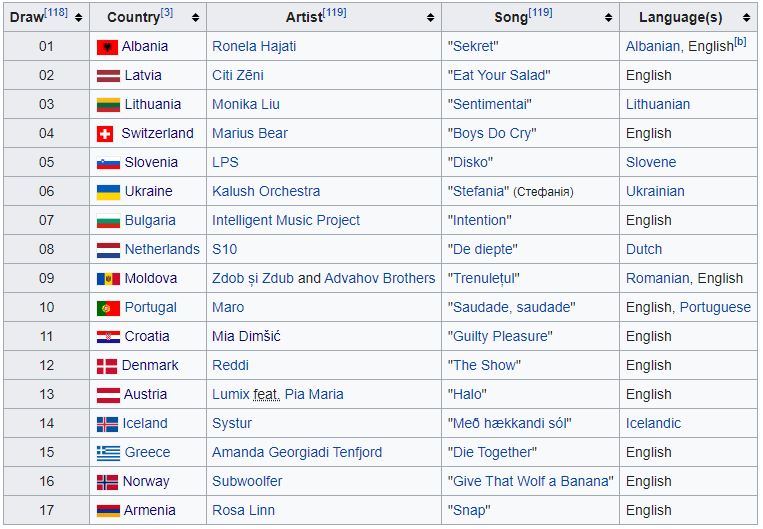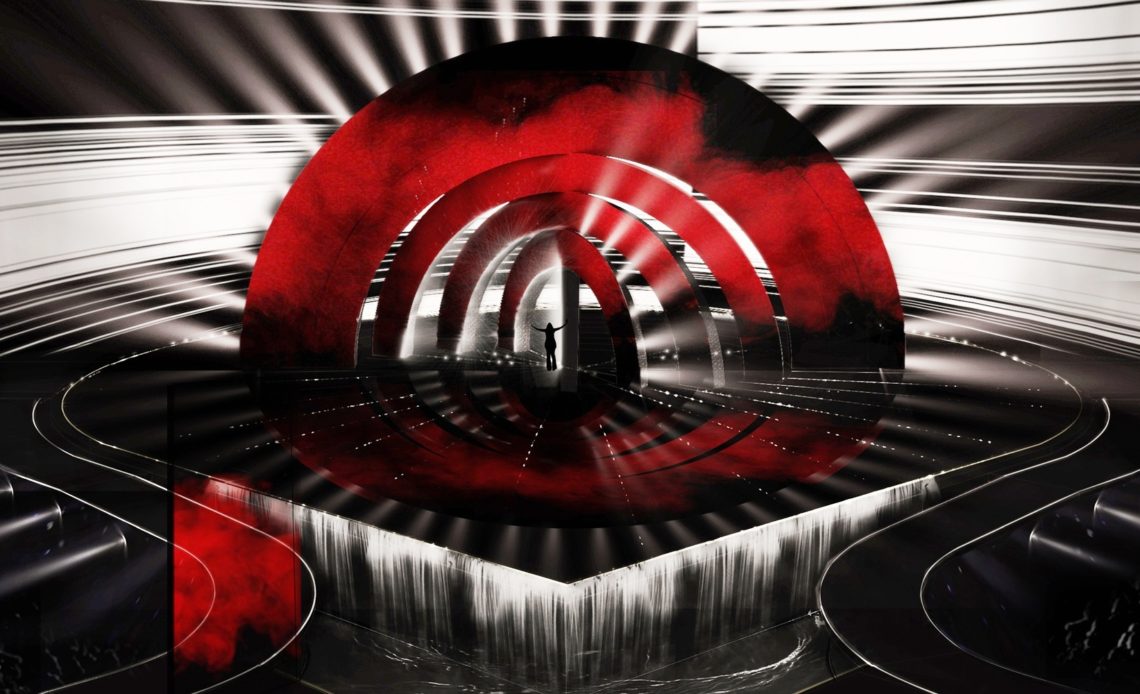
If you love Eurovision and national languages, you are amongst friends here. More specifically, if you enjoy amateur analytics, useless trivia and low-quality graphs: this is definitely the place for you.
I am a huge Eurovision fanatic and a bit of a language nerd, so each year, I am pretty excited to see which countries will be singing in their native language and which countries will be singing in English (booooo!).
This article is just a bit of fun to look at the trends of the contest in recent years: which languages are making a comeback, which countries are sticking to their national language and how does the ratio of English songs compare to those in other languages.
If that sounds like your cup of tea, then feel free to dive straight in!
For my in-depth analysis of the rise of English at Eurovision,
click here: National languages and the rise of English at Eurovision
*Please note: in this post, I will occasionally use the phrase ‘foreign language’ to denote non-English languages. This is purely because re-using the phrase ‘songs performed at-least partly in a language other than English’ is just boring and awkward. I am aware that French is not a foreign language in France, obviously.
OK, let’s run through the SEO-friendly questions first! For the juicy analysis, you might want to skip ahead to the good stuff…
How many entries in Eurovision 2022 feature a foreign language?
This year there are 17 countries entering a song that is sung at least partially in a language other than English. That is a modest increase on last year, when there were non-English 12 entries. Below is a recap of all this year’s songs.
Which countries are singing in their own language this year?
The countries bringing some linguistic diversity to the competition this year are: Albania, Cyprus, France (singing in Breton), Iceland, Italy, Lithuania, Moldova, Netherlands, Portugal, Romania (singing partially in Spanish), San Marino, Serbia (singing in Serbian and Latin), Slovenia, Spain and Ukraine.
EDIT: During the semi-finals, Montenegro and Croatian sang parts of their entries in Italian and Croatian respectively, which was a lovely surprise for everyone and meant I had to – happily – update this entire article.
Which languages will we hear on stage in Turin?
Over the course of the semi-finals and the Grand Final, we will heard songs sung in Albanian, Breton, Croatian, Dutch, Greek, Icelandic, three in Italian, Latin, Lithuanian, Portuguese, Serbian, Slovene, another two in Spanish and Ukrainian. And obviously, English. In fact, 32 songs out of 40 feature at least some lyrics in English.
Interestingly enough, the language we won’t be hearing this year – for the very first time in Eurovision history – is French. More on that below.
Ok now we’re on to the good stuff – including graphs which I very clearly made using Microsoft Excel…
How does Eurovision 2022 compare to previous years?
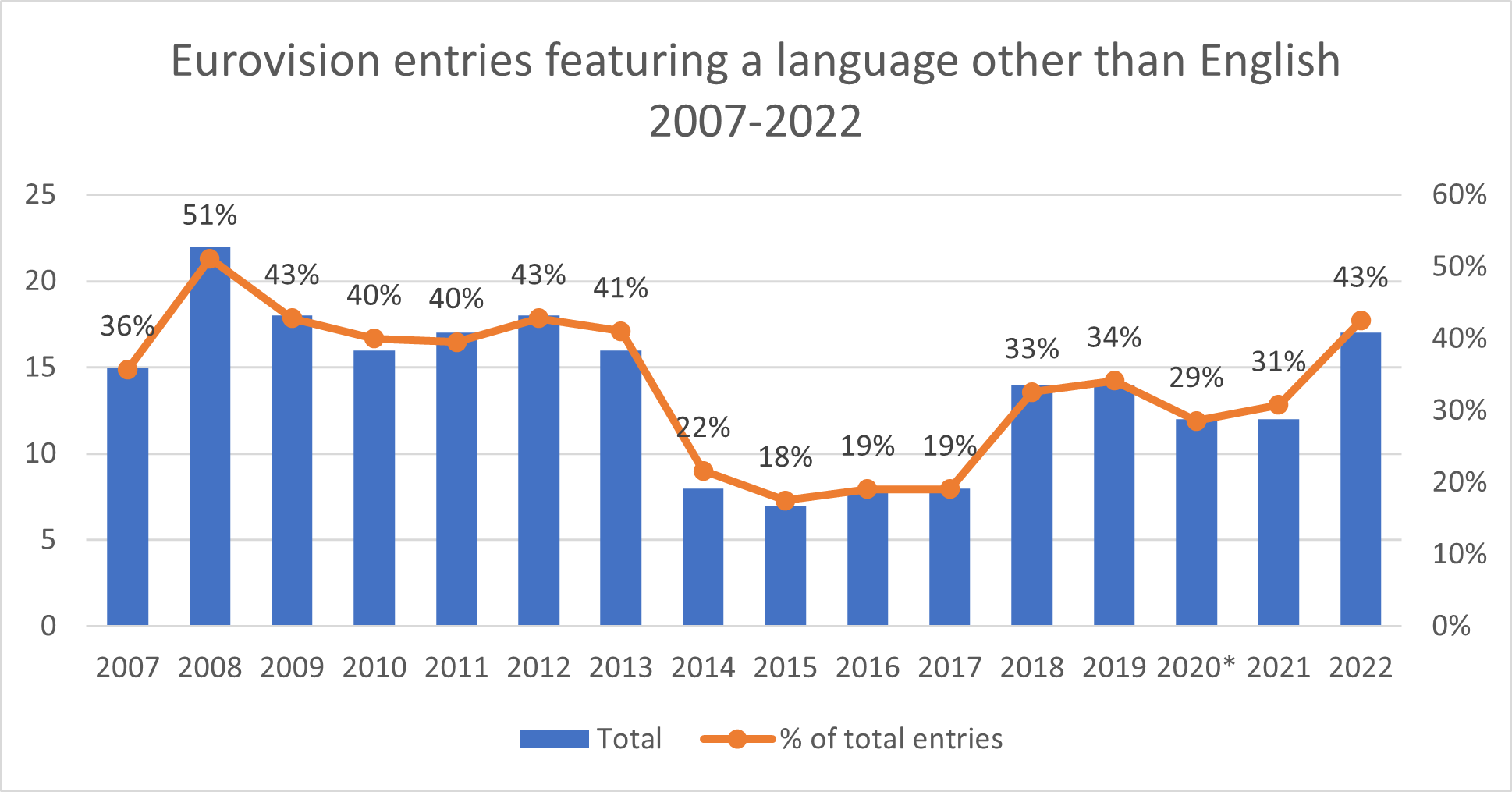
Languages at Eurovision since 2007 (Updated)
As we can see from the incredibly professional graph above, both the number and proportion of non-English songs has increased from last year, reaching a 10-year high. Yay!
But interestingly, despite two of the top 3 songs last year featuring French, the French language has disappeared from the contest all together this year! In a strange turn of events, no country will be singing even a phrase of French this year, despite the language having arguably its strongest year since 1989 – the year of the last French-language winner. Instead, the French entry will be sung in Breton, a Celtic language.
We can also see that the quantity and proportion of non-English songs is the highest it has been for 10 years. However, this is still well below the peak we saw in 2008. But… onwards and upwards, maybe?
Which languages are returning this year?
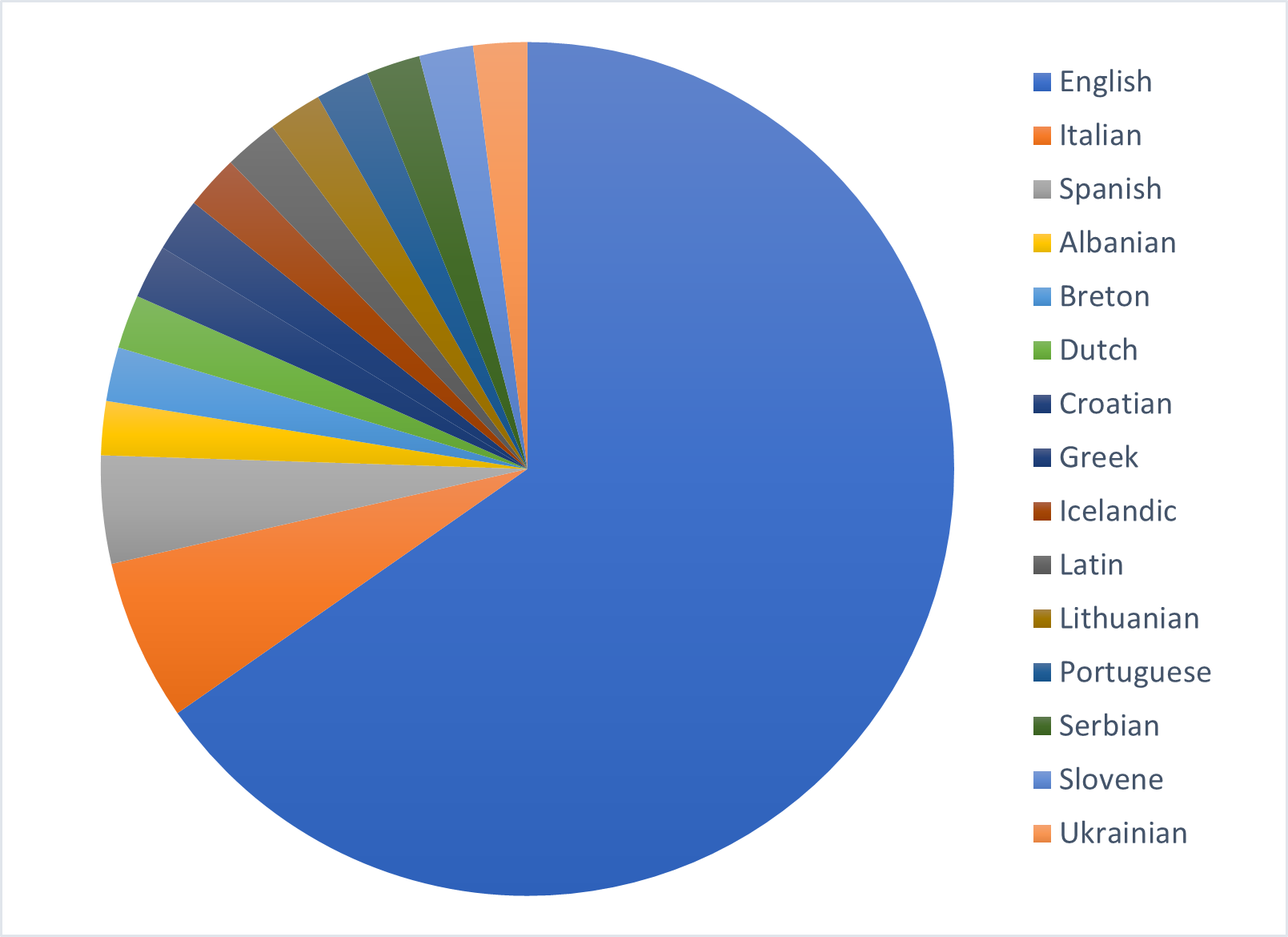
The languages of Eurovision songs 2022
Three languages from the 2022 contest have been missing from the Eurovision stage for quite some time (Dutch, Lithuanian and Breton), whilst this year’s contest will feature a song partially performed in Latin for the very first time, thanks to Serbia’s Konstratka.
Dutch is actually a relatively successful language when it comes to Eurovision; three Dutch-language entries have gone on to win the contest (in 1957, 1959 and 1969 respectively), second only to French with 15 winners and English with 34 winners. However, S10’s entry this year will only be the second Dutch-language entry since the national language rule was dropped in 1999. Her song De Diepte is a beautiful entry, by the way, and definitely one of my favourites this year.
Another language returning to the Eurovision stage this year after a long hiatus is Lithuanian. Monika Liu’s Sentimentai will be the first entry to feature Lithuanian since 2001 – and only the third ever. I have a huge soft spot for Lithuania at Eurovision and I am really hoping that Monika’s sultry, 1920s-inspired ballad will make it to the top 10. She is also a pretty huge star in her native Lithuania.

Monika Liu: Lithuania’s entrant for 2022
Finally, we will hear Breton on the Eurovision stage for only the second time in history (after France’s 1996 entry.) This year, Alvan and Ahez will be captivating European audiences with a Celtic legend about a woman dancing with the devil – or something. The band has big boots to fill, after France’s Barbara Pravi was the runner up in 2021 with her beautiful ballad, Voila.
I am also very happy to see that Portugal have returned to their roots with an entry in Portuguese. The Iberian nation broke linguists’ hearts across the continent last year, when they entered a song entirely in English – for the first time ever.
Also worthy of a mention is Moldova, whose entrants Zdob și Zdub will be singing (mostly) in Romanian – a first for Moldova since 2013. However, neighbours Romania sent a Romanian-language entry more recently: in 2015. Romania themselves will be singing in English and Spanish, naturally.
Could a non-English entry win the contest in 2022?
It’s very possible. As of 1 May 2022 (the day I finally sat down to write this), the five countries with the best odds of winning were Ukraine, Italy, Sweden, the United Kingdom and Spain – this is according to Eurovisionworld.com in its amalgamation of betting portals. Of these five, Ukraine, Italy and Spain are all entering songs sung at least partially in their native language.
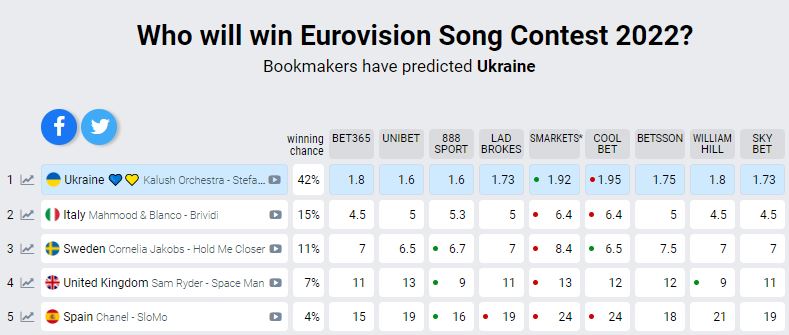
Betting odds for the winner of the 2022 contest, as of 1 May 2022
Of course, the odds only really tell part of the story; you have to wonder whether the Ukrainian entry will really sway the Jury vote or whether Spain’s Chanel can break Spain’s six-year streak of finishing outside the top 20. And – of course – the UK is just not going to win.
In my humble opinion, that leaves Italy and Sweden as the most likely winners of this bunch. But, I have been (very) wrong (many times) before…
Can we hope for more languages at Eurovision 2023 and beyond?
This is a question on almost every Eurofans’ lips when the start of the next Eurovision season rolls around. Eurovision 2021 was a particularly strong year for non-English entries; none of the top 3 songs last year featured English – the first time this had happened in 26 years!
However, this has not led to a huuuuge surge in songs featuring national language; the increase from 12 in 2021 to 17 in 2022 will nothing to sniff at, but it hasn’t quite been the tsunami it could have been. Will another English winner undo this “progress”? It’s impossible to say.
One point worth mentioning about this year’s contest is that due to bad luck, the non-English entries have been disproportionately drawn into the first half of first semi-final. That means that whilst 8 foreign-languages entries will be competing against each other in SF1, only three will be at logger-heads in SF2. If a large proportion of non-English entries fail to qualify from SF1, will that mean fewer foreign languages in 2023…?
Promising trends: are national languages making a comeback at Eurovision?
But if we look a bit more closely at countries individually, we do see some promising trends.
For example, Ukraine has entered songs entirely in Ukrainian for the past three years and considering the huge wave of patriotism sweeping the country in the face of Putin’s invasion, I wouldn’t expect this pattern to end any time soon.
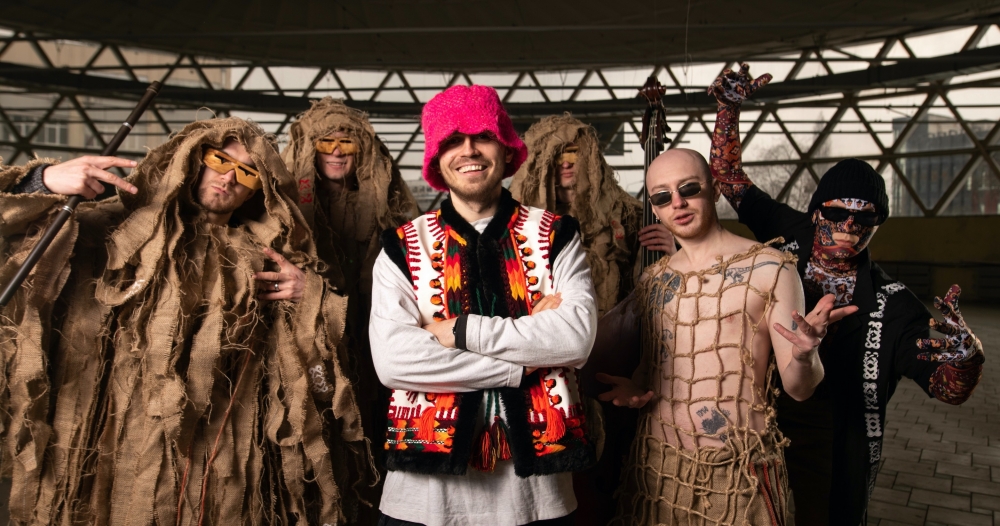
Kalush Orchestra: Ukraine’s entrants for 2022
Similarly, Serbia’s entries have been entirely in Serbian every year since 2018, while Albania’s entries have featured Albanian in four of the last five contests. Additionally, by adding a verse in Croatian at the last second to her entry, Mia Dimsic has ensured that we’ve heard Croatian in a Eurovision entry every year since 2019.
Additionally, if the Netherlands’ entry performs as strongly as I suspect it might (another top 3 finish, maybe…?), I wouldn’t be too surprised to see the Dutch broadcaster seeking out other Dutch-language artists to bring to the contest. Similarly in Lithuania, should Monika do well, we might well see more artists entering the Lithuanian national selection singing in their native Baltic tongue.

Would a strong finish for S10 mean more entries in Dutch in the future?
One bold prediction I would like to make is that next year Malta will be represented by AIDAN with a Maltese-language entry. The singer came second in Malta’s far-too-long and drawn-out selection song this year, but his song topped the Maltese chart for weeks and proved so popular with Eurofans that he toured Northern Europe and Spain with other Eurovision entrants – despite not being selected as the Maltese entrant. The song was also an absolute banger, so please enjoy it below.
But as we all know, if Eurovision is one thing, it is brilliantly unpredictable, so I guess we will never know what the next few contests might bring. (But personally, I would love a Welsh-language entry at some point, BBC…)
What are your predictions for the future? Comment below!


